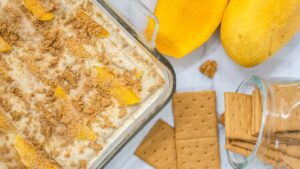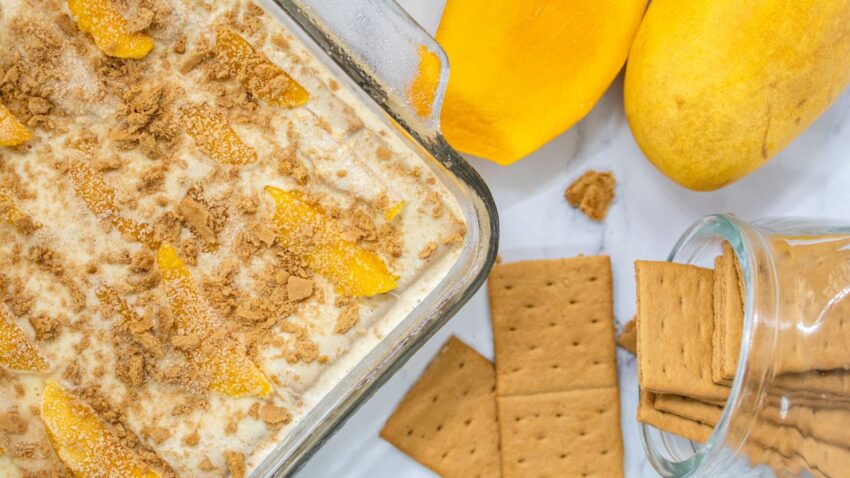Mangoes are not only delicious and sweet but also packed with essential nutrients that can be incredibly beneficial for babies. As a parent, introducing solid foods to your baby is an exciting milestone. When you decide to add fruits into your baby’s diet, mango can be one of the best options, thanks to its rich vitamin content and smooth texture. In this blog post, we will explore everything you need to know about mango baby food – its benefits, how to make it, and a few exciting recipes that both you and your baby will love.
Nutritional Benefits of Mango Baby Food
Mango is often referred to as the “king of fruits” due to its rich, sweet flavor and the numerous health benefits it offers. Here’s why mango is a fantastic choice for baby food:
1. Rich in Vitamins
Mangoes are high in Vitamin A and Vitamin C, both of which are crucial for a baby’s immune system, vision, and overall development. Vitamin A helps in maintaining healthy skin and eyes, while Vitamin C supports the immune system, reducing the risk of infections.
2. High in Fiber
The fiber content in mangoes aids in digestion, helping prevent constipation in babies. Introducing mango as part of your baby’s early diet can promote healthy bowel movements.
3. Boosts Immune System
The antioxidants and immune-boosting properties of mangoes help protect babies from illnesses and infections, making it an ideal fruit for their early diet.
4. Natural Sugar for Energy
Unlike processed sugars, the natural sugars found in mangoes provide a steady release of energy, ensuring that your baby stays active and alert throughout the day.
5. Supports Skin Health
Mangoes are known for improving skin health, as they contain high levels of beta-carotene and other antioxidants that promote glowing and healthy skin.
When to Introduce Mango to Your Baby?
Mango is a great first food for babies, but it is important to wait until your baby is around 6 months old and is ready for solid foods. Before introducing mango, ensure that your baby has already started eating other fruits and vegetables. Always check for any allergic reactions when introducing a new food.
How to Prepare Mango Baby Food?
Mango baby food is incredibly easy to prepare, and there are a variety of ways to introduce it to your little one. Let’s walk through some simple steps to make mango baby food at home.
1. Pureed Mango
The easiest and most common way to serve mango to your baby is by pureeing it. Here’s how you can do it:
- Peel and remove the pit from a ripe mango.
- Cut the mango into small chunks.
- Blend the mango chunks in a blender or food processor until smooth.
- If needed, you can add a little water or breast milk to achieve the desired consistency.
Tip: If you prefer, you can freeze the pureed mango in ice cube trays and store them for later use.
2. Mango and Banana Mash
Mango and banana make a perfect pairing. Bananas add smoothness and sweetness, making this a delightful combination for your baby. Here’s how you can make it:
- Mash half a ripe mango and half a ripe banana together.
- If needed, add a little breast milk or formula to achieve the right consistency.
3. Mango Smoothie (For Older Babies)
For babies older than 8 months, you can introduce mango smoothies. Mix mango, yogurt, and a few other fruits like blueberries or strawberries for a healthy and delicious drink.

Mango Baby Food Recipes
Now that you know how to prepare mango, let’s dive into some exciting mango baby food recipes that are perfect for your little one!
Mango and Avocado Puree
Avocado and mango are both rich in healthy fats and essential nutrients. This simple puree is packed with goodness.
Ingredients:
- 1 ripe mango
- 1 ripe avocado
Instructions:
- Peel and chop both the mango and avocado.
- Blend them together until smooth. If the puree is too thick, add a little water or breast milk to thin it out.
Mango and Oatmeal Porridge
This recipe is perfect for babies starting solids. The oats provide fiber and energy, while mango adds sweetness and flavor.
Ingredients:
- 2 tablespoons oats
- 1/2 cup water or breast milk
- 1/4 cup mango puree
Instructions:
- Cook the oats with water or breast milk until soft.
- Stir in the mango puree and mix well. Allow it to cool to room temperature before serving.
Mango and Carrot Puree
For babies who are ready for more complex flavors, this mango and carrot puree provides both sweetness and savory taste.
Ingredients:
- 1 ripe mango
- 1/2 cup carrots, steamed
Instructions:
- Steam the carrots until soft.
- Blend the mango and steamed carrots together until smooth. Add a little water or breast milk if needed.
Storage Tips for Mango Baby Food
Mango baby food can be stored in the refrigerator for up to 3 days. For longer storage, freeze the puree in ice cube trays and store them in a sealed container for up to 3 months. This makes it easy to have fresh, homemade baby food on hand at all times.
Precautions to Take While Feeding Mango to Your Baby
- Allergy Check: While mangoes are rarely allergic, some babies may have a mild allergic reaction. Introduce mango slowly and watch for any signs of allergies such as rashes or swelling.
- Freshness: Always use ripe mangoes for baby food. Overripe or under-ripe mangoes may not be safe for babies.
- Avoid Choking Hazards: Always ensure that the mango is pureed or mashed to avoid any choking hazards.
Conclusion
Mango baby food is not only nutritious but also incredibly delicious, making it a great choice for your baby’s first foods. Packed with vitamins, fiber, and antioxidants, mango can help promote your baby’s health and development. Whether you puree it, mash it, or make fun smoothies, there are many ways to enjoy mango with your little one. Always remember to introduce new foods slowly and watch for any reactions to ensure that your baby has a safe and enjoyable eating experience.
FAQs about Mango Baby Food
1. Can I give mango to my 4-month-old baby?
It’s recommended to wait until your baby is 6 months old before introducing solid foods like mango. Always consult your pediatrician before starting any new food.
2. How can I tell if a mango is ripe enough for my baby?
A ripe mango will yield slightly when pressed gently and have a sweet aroma. Avoid mangoes that are too hard or overripe.
3. Is mango safe for babies with sensitive stomachs?
Yes, mango is generally gentle on the stomach. However, if your baby has a sensitive stomach or is prone to digestive issues, start with small amounts and monitor closely for any reactions.
4. Can I mix mango with other fruits?
Yes, you can mix mango with other fruits like bananas, apples, or blueberries to create a variety of flavorful baby foods.

1 thought on “Mango Baby Food: Nutritional Benefits”